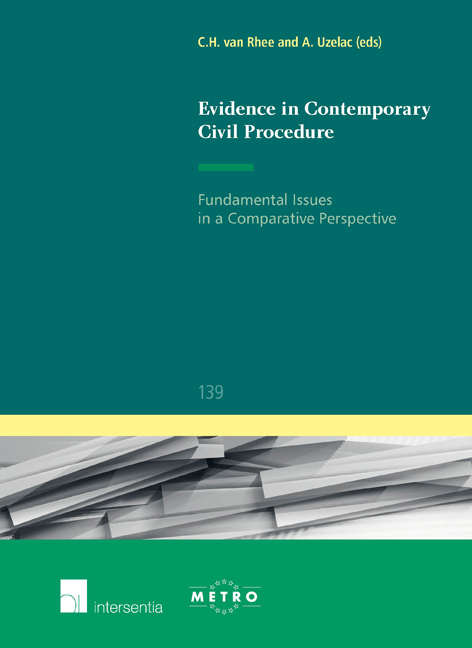Book contents
- Frontmatter
- Contents
- List of Authors
- Acknowledgements
- INTRODUCTION
- FUNDAMENTAL AND OTHER PRINCIPLES OF EVIDENCE IN CIVIL LITIGATION
- EVIDENCE AND THE PRINCIPLE OF PROPORTIONALITY. HOW TO GET RID OF EXPENSIVE AND TIME-CONSUMING EVIDENCE?
- DISCLOSURE OF DOCUMENTS IN CIVIL PROCEDURE: THE PRIVILEGE AGAINST SELFINCRIMINATION OR A QUEST FOR PROCEDURAL FAIRNESS AND SUBSTANTIVE JUSTICE
- PRECLUSION OF LATE ALLEGATIONS AND EVIDENCE AS A TOOL TO INCREASE THE EFFICIENCY OF CIVIL PROCEEDINGS IN POLAND: A SHORT STORY OF THE UGLY PAST AND THE WAY TO A BRIGHT FUTURE
- THE ‘RIGHT TO PROOF’ AND THE ‘LOYALTY PRINCIPLE’: A FRENCH PERSPECTIVE
- RESTRICTIONS ON THE ADMISSIBILITY OF EVIDENCE
- TAKING LENIENCY DOCUMENTS AS EVIDENCE IN DAMAGES ACTIONS IN CASES OF COMPETITION LAW INFRINGEMENT
- LOST IN TRANSLATION? LANGUAGE DIFFERENCES AND THEIR IMPACT ON EVIDENCETAKING IN LITIGATION
- EVIDENCE, INFORMATION TECHNOLOGY AND PRINCIPLES OF CIVIL PROCEDURE – THE HUNGARIAN PERSPECTIVE
- THE POTENTIAL IMPACT OF ELECTRONIC PROCEEDINGS ON TRADITIONAL PRINCIPLES OF CIVIL PROCEDURE – THE SLOVENIAN EXPERIENCE
- TYPES OF EVIDENCE IN CIVIL LITIGATION
- EVIDENCE IN ARBITRATION AND NATIONAL CIVIL LITIGATION
- REGISTRAR
- EVIDENCE IN CROSS BORDER CIVIL LITIGATION
- IUS COMMUNE EUROPAEUM
DISCLOSURE OF DOCUMENTS IN CIVIL PROCEDURE: THE PRIVILEGE AGAINST SELFINCRIMINATION OR A QUEST FOR PROCEDURAL FAIRNESS AND SUBSTANTIVE JUSTICE
from FUNDAMENTAL AND OTHER PRINCIPLES OF EVIDENCE IN CIVIL LITIGATION
Published online by Cambridge University Press: 15 December 2017
- Frontmatter
- Contents
- List of Authors
- Acknowledgements
- INTRODUCTION
- FUNDAMENTAL AND OTHER PRINCIPLES OF EVIDENCE IN CIVIL LITIGATION
- EVIDENCE AND THE PRINCIPLE OF PROPORTIONALITY. HOW TO GET RID OF EXPENSIVE AND TIME-CONSUMING EVIDENCE?
- DISCLOSURE OF DOCUMENTS IN CIVIL PROCEDURE: THE PRIVILEGE AGAINST SELFINCRIMINATION OR A QUEST FOR PROCEDURAL FAIRNESS AND SUBSTANTIVE JUSTICE
- PRECLUSION OF LATE ALLEGATIONS AND EVIDENCE AS A TOOL TO INCREASE THE EFFICIENCY OF CIVIL PROCEEDINGS IN POLAND: A SHORT STORY OF THE UGLY PAST AND THE WAY TO A BRIGHT FUTURE
- THE ‘RIGHT TO PROOF’ AND THE ‘LOYALTY PRINCIPLE’: A FRENCH PERSPECTIVE
- RESTRICTIONS ON THE ADMISSIBILITY OF EVIDENCE
- TAKING LENIENCY DOCUMENTS AS EVIDENCE IN DAMAGES ACTIONS IN CASES OF COMPETITION LAW INFRINGEMENT
- LOST IN TRANSLATION? LANGUAGE DIFFERENCES AND THEIR IMPACT ON EVIDENCETAKING IN LITIGATION
- EVIDENCE, INFORMATION TECHNOLOGY AND PRINCIPLES OF CIVIL PROCEDURE – THE HUNGARIAN PERSPECTIVE
- THE POTENTIAL IMPACT OF ELECTRONIC PROCEEDINGS ON TRADITIONAL PRINCIPLES OF CIVIL PROCEDURE – THE SLOVENIAN EXPERIENCE
- TYPES OF EVIDENCE IN CIVIL LITIGATION
- EVIDENCE IN ARBITRATION AND NATIONAL CIVIL LITIGATION
- REGISTRAR
- EVIDENCE IN CROSS BORDER CIVIL LITIGATION
- IUS COMMUNE EUROPAEUM
Summary
‘Nobody is obliged to testify against himself and to offer evidence, unfavourable to him.’
Triva, Belajec and Dika, Građansko parnično procesno pravo, 1986, p. 425
‘In this country litigation … is conducted ‘cards face up on the table’. Some people … regard this as incomprehensible. ‘Why’, they ask, ‘should I be expected to provide my opponent with the means of defeating me?’ The answer, of course, is that litigation is not a war or even a game. It is designed to do real justice between opposing parties and, if the court does not have all the relevant information, it cannot achieve this object.’
Sir John Donaldson MR in Davies v. Eli Lilly & Co. [1987] 1 WLR 428.Introduction
In Slovenian (and in former Yugoslav) civil procedure, party access to relevant information and documents, which are in the possession of the opponent and which could adversely affect the opponent's case, is limited. Traditionally, based on a German and Austrian heritage of civil procedure, the principle that no one is obliged to help his adversary win the case (nemo tenetur edere contra se) applied. Experience and recent developments abroad – not only in common law jurisdictions, which have for a long time embraced broad duties to disclose, but also in civil law systems which were traditionally restrictive in requiring the parties to contribute to the establishment of the true facts – show that this approach needs to be re-examined.
The alternative to the principle that the party to a civil case cannot be obliged to ‘put weapons in the hand of its opponent’ is the common law concept of disclosure of documents. Thereby especially the English Civil Procedure Rules of 1998 (which have done away with some extremes of discovery) seem to be an important source of inspiration for Legislatures in civil law jurisdictions nowadays. The main idea of ‘disclosure’ is that the parties should as early as possible give advance notice of all relevant documents – not just those supporting their case but including those which adversely affect their case or which support the other party's case.
- Type
- Chapter
- Information
- Evidence in Contemporary Civil ProcedureFundamental Issues in a Comparative Perspective, pp. 33 - 56Publisher: IntersentiaPrint publication year: 2015



